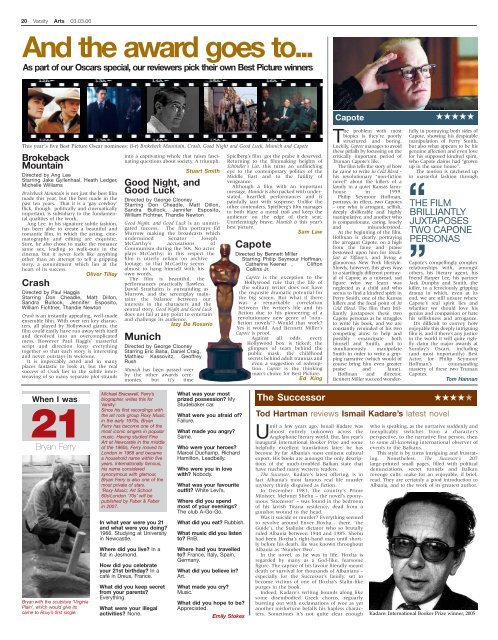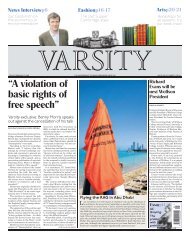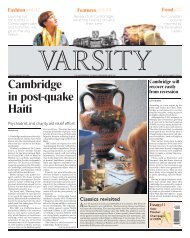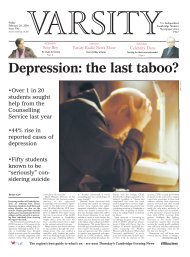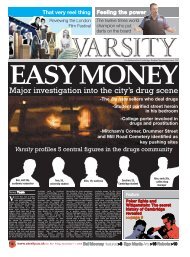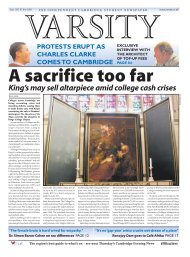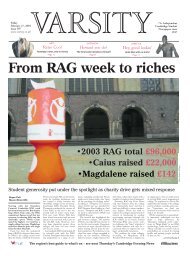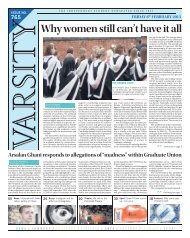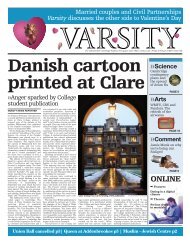The Oxbridge Gap - Varsity
The Oxbridge Gap - Varsity
The Oxbridge Gap - Varsity
Create successful ePaper yourself
Turn your PDF publications into a flip-book with our unique Google optimized e-Paper software.
20 <strong>Varsity</strong> Arts 03.03.06<br />
And the award goes to...<br />
As part of our Oscars special, our reviewers pick their own Best Picture winners<br />
This year’s five Best Picture Oscar nominees: (l-r) Brokeback Mountain, Crash, Good Night and Good Luck, Munich and Capote<br />
Brokeback<br />
Mountain<br />
Directed by Ang Lee<br />
Starring Jake Gyllenhaal, Heath Ledger,<br />
Michelle Williams<br />
Brokeback Mountain is not just the best film<br />
made this year, but the best made in the<br />
past ten years. That it is a ‘gay cowboy’<br />
flick, though politically and cinematically<br />
important, is subsidiary to the fundamental<br />
qualities of the work.<br />
Ang Lee, in his signature subtle fashion,<br />
has been able to create a beautiful and<br />
romantic film, in which the acting, cinematography<br />
and editing are exquisite.<br />
Sure, he also chose to make the romance<br />
same sex, leading to walk-outs in the<br />
cinema, but it never feels like anything<br />
other than an attempt to tell a gripping<br />
story, a commitment which lies at the<br />
heart of its success.<br />
Oliver Tilley<br />
Crash<br />
Directed by Paul Haggis<br />
Starring Don Cheadle, Matt Dillon,<br />
Sandra Bullock, Jennifer Esposito,<br />
William Fichtner, Thandie Newton<br />
Crash is an instantly appealing, well-made<br />
ensemble film. With over ten key characters,<br />
all played by Hollywood giants, the<br />
film could easily have run away with itself<br />
and devolved into an overcomplicated<br />
mess. However Paul Haggis’ masterful<br />
script and direction keep everything<br />
together so that each story is interesting<br />
and never outstays its welcome.<br />
It is impeccably acted and in many<br />
places fantastic to look at, but the real<br />
success of Crash lies in the subtle interweaving<br />
of so many separate plot strands<br />
into a captivating whole that raises fascinating<br />
questions about society. A triumph.<br />
Stuart Smith<br />
Good Night, and<br />
Good Luck<br />
Directed by George Clooney<br />
Starring Don Cheadle, Matt Dillon,<br />
Sandra Bullock, Jennifer Esposito,<br />
William Fichtner, Thandie Newton<br />
Good Night, and Good Luck is an unmitigated<br />
success. <strong>The</strong> film portrays Ed<br />
Murrow making the broadcasts which<br />
undermined Senator Joseph<br />
McCarthy’s accusations of<br />
Communism during the 50s. No actor<br />
plays McCarthy; in this respect the<br />
film is utterly reliant on archive<br />
footage, so that McCarthy seems<br />
almost to hang himself with his<br />
own words.<br />
<strong>The</strong> film is beautiful, the<br />
performances practically flawless.<br />
David Strathairn is outstanding as<br />
Murrow, and the screenplay maintains<br />
the balance between our<br />
interests in the characters and the<br />
central story. Good Night and Good Luck<br />
does not fail at any point to entertain<br />
and challenge its audience.<br />
Izzy De Rosario<br />
Munich<br />
Directed by George Clooney<br />
Starring Eric Bana, Daniel Craig,<br />
Mathieu Kassovitz, Geoffrey<br />
Rush<br />
Munich has been passed over<br />
by the other awards ceremonies,<br />
but it’s time<br />
Spielberg’s film got the praise it deserved.<br />
Returning to the filmmaking heights of<br />
Schindler’s List, this turns an unflinching<br />
eye to the contemporary politics of the<br />
Middle East and to the futility of<br />
vengeance.<br />
Although a film with an important<br />
message, Munich is also packed with understated,<br />
heartfelt performances and is<br />
painfully taut with suspense. Unlike the<br />
other contenders, Spielberg’s film manages<br />
to both blaze a moral trail and keep the<br />
audience on the edge of their seat.<br />
Unrelentingly brave, Munich is this year’s<br />
best picture.<br />
Sam Law<br />
Capote<br />
Directed by Bennett Miller<br />
Starring Philip Seymour Hoffman,<br />
Catherine Keener , Clifton<br />
Collins Jr.<br />
Capote is the exception to the<br />
Hollywood rule that the life of<br />
the solitary writer does not have<br />
the requisite dramatic potential for<br />
the big screen. But what if there<br />
was a remarkable correlation<br />
between the writer’s life and his<br />
fiction due to his pioneering of a<br />
revolutionary new genre of “nonfiction<br />
novels”? Would that work?<br />
Yes it would. And Bennett Miller’s<br />
Capote is proof.<br />
Against all odds. every<br />
Hollywood box is ticked; the<br />
glimpses of tears behind the<br />
public mask, the childhood<br />
secrets behind adult traumas and<br />
even a suggestion of redemption.<br />
Capote is the thinking<br />
man’s choice for Best Picture.<br />
Ed King<br />
Capote<br />
★★★★★<br />
<strong>The</strong> problem with most<br />
biopics is they’re poorly<br />
structured and boring.<br />
Luckily, Capote manages to avoid<br />
these pitfalls by focussing on the<br />
critically important period of<br />
Truman Capote’s life.<br />
<strong>The</strong> film tells the story of how<br />
he came to write In Cold Blood -<br />
his revolutionary “non-fiction<br />
novel” about the killers of a<br />
family in a quiet Kansas farmhouse<br />
in 1959.<br />
Philip Seymour Hoffman,<br />
portrays, in effect, two Capotes<br />
- one who is arrogant, selfish,<br />
deeply dislikeable and highly<br />
manipulative, and another who<br />
is compassionate, caring, lonely<br />
and misunderstood.<br />
At the beginning of the film,<br />
Hoffman is clearly portraying<br />
the arrogant Capote, on a high<br />
from the fame and praise<br />
bestowed upon him for Breakfast<br />
at Tiffany’s, and living a<br />
glamorous New York lifestyle.<br />
Slowly, however, this gives way<br />
to a startlingly different portrayal<br />
of Capote as a misread, sad<br />
figure who we learn was<br />
neglected as a child and who<br />
seems to find a kindred spirit in<br />
Perry Smith, one of the Kansas<br />
killers and the focal point of In<br />
Cold Blood. <strong>The</strong> film then brilliantly<br />
juxtaposes these two<br />
Capote personas as he struggles<br />
to write his book, and we are<br />
constantly reminded of his two<br />
competing aims: to help and<br />
possibly emancipate both<br />
himself and Smith, and to<br />
simultaneously manipulate<br />
Smith in order to write a gripping<br />
narrative (which would of<br />
course bring him even greater<br />
praise and fame).<br />
Hoffman and director,<br />
Bennett Miller succeed wonderfully<br />
in portraying both sides of<br />
Capote, showing his despicable<br />
manipulation of Perry Smith,<br />
but also what appears to be his<br />
genuine affection and even love<br />
for his supposed kindred spirit,<br />
who Capote claims had “grown<br />
up in the same house”.<br />
<strong>The</strong> tension is ratcheted up<br />
in masterful fashion through<br />
“ THE FILM<br />
BRILLIANTLY<br />
JUXTAPOSES<br />
TWO CAPONE<br />
PERSONAS<br />
”<br />
Capote’s compellingly complex<br />
relationships with, amongst<br />
others, his literary agent, his<br />
friend Harper Lee, his partner<br />
Jack Dunphy and Smith, the<br />
killer, to a ferociously gripping<br />
drama in which, even at its<br />
end, we are still unsure where<br />
Capote’s real spirit lies and<br />
whether we should love his<br />
genius and compassion or hate<br />
his selfishness and arrogance.<br />
It’s difficult to convey how<br />
enjoyable this deeply intriguing<br />
film is, and if there’s any justice<br />
in the world it will quite righlly<br />
claim the major awards at<br />
Sunday’s Oscars, including<br />
(and most importantly) Best<br />
Actor, for Philip Seymour<br />
Hoffman’s commanding<br />
mastery of these two Truman<br />
Capotes.<br />
Tom Hannan<br />
When I was<br />
21<br />
Bryan Ferry<br />
Bryan with the sculpture ‘Virginia<br />
Plain’, which would give its<br />
name to Roxy’s first single.<br />
Michael Bracewell, Ferry’s<br />
biographer, writes this for<br />
<strong>Varsity</strong>:<br />
Since his first recordings with<br />
the art rock group Roxy Music<br />
in the early 1970s, Bryan<br />
Ferry has become one of the<br />
most iconic singers in popular<br />
music. Having studied Fine<br />
Art at Newcastle in the middle<br />
of the 1960s, Ferry moved to<br />
London in 1968 and became<br />
a household name within five<br />
years. Internationally famous,<br />
his name considered<br />
synonymous with glamour,<br />
Bryan Ferry is also one of the<br />
most private of stars.<br />
'Roxy Music; Art School<br />
60s/London '70s’ will be<br />
published by Faber & Faber<br />
in 2007.<br />
In what year were you 21<br />
and what were you doing?<br />
1966. Studying at University<br />
in Newcastle.<br />
Where did you live? In a<br />
flat in Jesmond.<br />
How did you celebrate<br />
your 21st birthday? In a<br />
café in Dreus, France.<br />
What did you keep secret<br />
from your parents?<br />
Everything.<br />
What were your illegal<br />
activities? None.<br />
What was your most<br />
prized possession? My<br />
Studebaker car.<br />
What were you afraid of?<br />
Failure.<br />
What made you angry?<br />
Same.<br />
Who were your heroes?<br />
Marcel Duchamp, Richard<br />
Hamilton, Leadbelly.<br />
Who were you in love<br />
with? Nobody.<br />
What was your favourite<br />
outfit? White Levi’s.<br />
Where did you spend<br />
most of your evenings?<br />
<strong>The</strong> club A-Go-Go.<br />
What did you eat? Rubbish.<br />
What music did you listen<br />
to? RnB.<br />
Where had you travelled<br />
to? France, Italy, Spain,<br />
Germany.<br />
What did you believe in?<br />
Art.<br />
What made you cry?<br />
Music.<br />
What did you hope to be?<br />
Appreciated.<br />
Emily Stokes<br />
<strong>The</strong> Successor<br />
Tod Hartman reviews Ismail Kadare’s latest novel<br />
★★★★★<br />
Until a few years ago, Ismail Kadare was who is speaking, as the narrative suddenly and<br />
almost entirely unknown across the inexplicably switches from a character’s<br />
Anglophone literary world. But, last year’s perspective, to the narrative first person, then<br />
inaugural International Booker Prize and some to some all-knowing international observer of<br />
helpfully excellent translations later, he has events in the Balkans.<br />
become by far Albania’s most eminent cultural This style is by turns intriguing and frustrating.<br />
Nonetheless, <strong>The</strong> Successor’s 207<br />
export. His books are amongst the only descriptions<br />
of the much-troubled Balkan state that large-printed small pages, filled with political<br />
have reached many western readers.<br />
denunciations, secret tunnels and Balkan<br />
<strong>The</strong> Successor, Kadare’s latest offering, is in revenge cults, make for an enjoyable, if brief,<br />
fact Albania’s most famous real life murder read. <strong>The</strong>y are certainly a good introduction to<br />
mystery thinly disguised as fiction.<br />
Albania, and to the work of its greatest author.<br />
In December 1981, the country’s Prime<br />
Minister, Mehmet Shehu – the novel’s eponymous<br />
‘Successor’ – was found in the bedroom<br />
of his lavish Tirana residence, dead from a<br />
gunshot wound to the head.<br />
Was it suicide or murder? Everything seemed<br />
to revolve around Enver Hoxha - (here, ‘the<br />
Guide’), the Stalinist dictator who so brutally<br />
ruled Albania between 1944 and 1985. Shehu<br />
had been Hoxha’s right-hand man until shortly<br />
before his death. He was known throughout<br />
Albania as ‘Number Two’.<br />
In the novel, as he was in life, Hoxha is<br />
regarded by many as a God-like, fearsome<br />
figure. <strong>The</strong> caprice of his favour literally meant<br />
death or survival for thousands of Albanians –<br />
especially for the Successor’s family, set to<br />
become victims of one of Hoxha’s Stalin-like<br />
purges in the book.<br />
Indeed, Kadare’s writing bounds along like<br />
some disembodied Greek chorus, reguarly<br />
bursting out with exclamations of woe as yet<br />
another misfortune befalls his hapless characters.<br />
Sometimes it’s not quite clear enough Kadare: International Booker Prize winner, 2005


